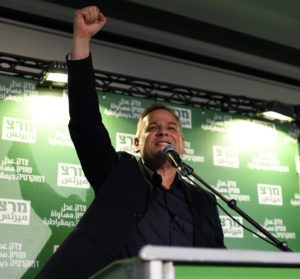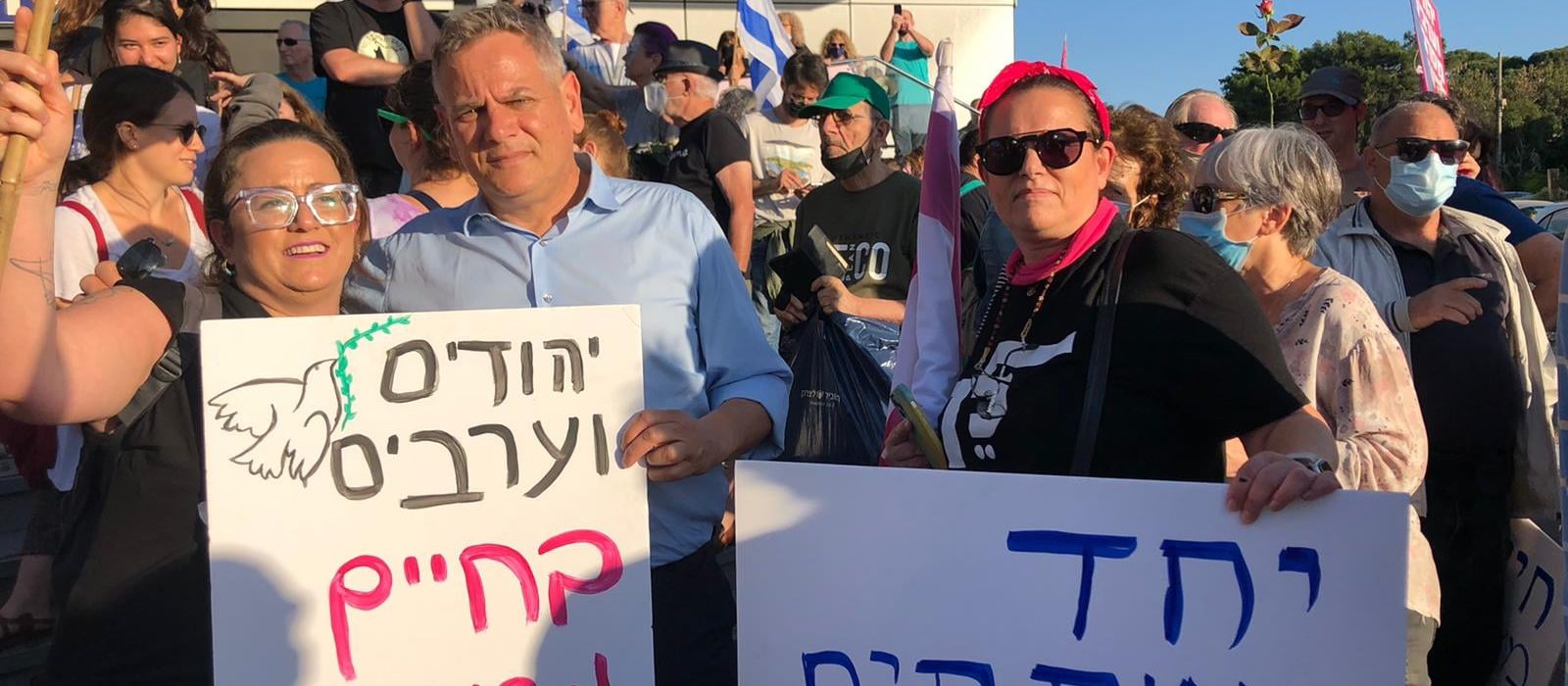- About Us
- Policy Center
- Learn
- Press Room
- Blog
- Get Involved
- Donate
- Donate to J Street Online
- Make a Gift in Someone’s Honor or Memory
- Make a Monthly Gift
- Tax-Deductible Donations
- Giving by mail

J Street’s “Our Israel” project spotlights the amazing Israeli groups who share our progressive vision for Israel, and who are helping build a society underpinned by the founding values of democracy, self-determination and equality which are enshrined in Israel’s Declaration of Independence.

“When I first entered politics 14 years ago, nobody would have imagined having a gay minister in the cabinet,” Minister of Health Nitzan Horowitz tells J Street.
His journey began in 2008 when the award-winning journalist — who had worked as a foreign correspondent and international editor for leading Israeli outlets — decided to make the jump into domestic politics, a familiar path for many Israeli politicians.
“I know that in going into politics, it means also becoming a politician,” Horowitz told The Jerusalem Post at the time. “I go there not because I am looking for a job, but as someone who has an agenda and ideology.”
From climate change to LGBT+ rights to achieving a peaceful two-state solution to the Israeli-Palestinian conflict, Horowitz saw joining Israel’s progressive political party Meretz as a means for tackling the issues he had covered for decades.
When he won a seat in the Knesset — the Israeli parliament — he became the second-ever openly gay member. Today, he’s the leader of the party and serves as Health Minister in a broad, unity government formed in 2021 to end Prime Minister Netanyahu’s 12 years in power.
“We’ve made a very big leap forward,” he says. In 2008, Horowitz served alongside openly homophobic members of the Knesset who had no qualms dehumanizing LGBT+ Israelis.
“The next time Haredi MKs attack gays or allege that they are sick, they will have to look one in the eye,” a reporter for Haaretz wrote at the time.
“We’ve made an enormous advancement in recent years regarding the acceptance of LGBT people in Israeli society,” Horowitz says. “But there are still dark places where this is not yet accepted.”
The level of discrimination and homophobia facing LGBT+ Israelis was intolerable, Horowitz tells J Street. “People suffered so much just for being who they are.”
Proud record
At the time of writing, Horowitz’s tenure as Health Minister is coming to an end.
Ultimately, divisions between left and right in his coalition government, exacerbated by an ongoing pressure campaign from Netanyahu’s right-wing opposition, pushed two right-wing MKs to defect, splintering the coalition’s ability to renew key legislation.
New elections are expected in October, and Horowitz will likely remain Health Minister in the caretaker government until then.
As well as the unenviable task of managing Israel’s health service through the ongoing pandemic, Horowitz is proud of the advancements he pushed forward for LGBT+ equality.
He lifted surrogacy restrictions on same-sex couples and the ban on gay men donating blood — becoming one of the first to donate blood himself. “From today, my blood is equal,” he said that day. “There is no gay man in Israel who does not know the insult that accompanies not being able to donate blood. It is such humiliation and a fundamental violation of equality. It has become a symbol of discrimination against Israel’s LGBT community.”
Horowitz also pushed through a ban on the harmful, scientifically discredited practice of “conversion therapy” and made gender-affirming surgery more accessible. “Each of these alone was a topic of huge debate for many years,” he says.
This progress has come despite Meretz’s role as a minor player within a broader, eight-party coalition government that was led by an ardent, pro-settlement Prime Minister, Neftali Bennet.
“This is a historic government that saved Israeli democracy. I’m proud of our part in it. We made an enormous effort to preserve it; its achievements will be remembered for many years. Meretz will continue to work on Israelis’ behalf and will fight for our values in the coming election,” Horowitz said upon the coalition’s decision to dissolve.
It hasn’t been all success, however.
Horowitz’s long-running campaign to legalize civil, non-religiously officiated marriages has not yet borne fruit. With religious authorities governing marriage, secular marriage ceremonies — including same-sex marriage ceremonies — are not recognized if they’re performed in Israel.
“Unlike the US, Israel doesn’t have separation between state and church,” Horowitz tells J Street. “Nevertheless, we advanced tremendously by recognizing couples that are not married as if they are married. It’s called common law marriage.”
Unequal equality
Speaking to J Street during pride month from his hometown of Tel Aviv — often referred to as something of a ‘gay Mecca’ of the Middle East — Horowitz marvels at the progress that’s still being made.
“Compared to countries around Israel, Israel is a good place for gays to live,” Horowitz says, “but there is a ‘but’ to that.”
LGBT+ Israelis from conservative areas and within religious, cultural and ethnic minorities can struggle to feel equal and accepted. Just 40 miles down the road, in Jerusalem, it’s much more of a challenge to be openly queer, Horowitz says.
“Many people still see LGBT+ issues as a contradiction to the holiness of Jerusalem, something that stains the status of the city,” Executive Director of Jerusalem Open House, Alon Shachar, told J Street in a 2020 interview.
Horowitz says these “darker spots” are where the equality movement must now focus its effort. “So that everybody can enjoy the life that we have in Tel Aviv.”

Equality for all
It’s not just equality for LGBT+ Israelis that Horowitz champions. Meretz is one of a number of progressive and Arab political parties that explicitly recognizes the Palestinian people’s right to self-determination and the need to end Israel’s occupation of Gaza and the West Bank.
“[Palestinians] deserve basic rights, human rights like freedom of movement and sovereignty like every other people on the planet,” Horowitz tells J Street.
He’s dismissive of efforts by some, particularly in conservative circles in the United States, to contest the idea that Israel is occupying Palestinian territory. “It’s a military occupation, and I don’t think we should deny or avoid it.”
“Occupation doesn’t just have a negative connotation — it is negative. It is not a good situation, and we should end it,” he says. “The first step in ending occupation is realizing that this is occupation. Otherwise there is nothing to end.”
The Israeli government’s ongoing, undemocratic control of Palestinian territory and the millions of Palestinians who live there presents a national security threat, undermines Israel’s democratic character, puts young Israelis lives in danger when they serve on the frontlines and violates the democratic rights and freedoms of Palestinians.
“It’s important that Israelis here understand that many Jews around the world, especially in the US, are progressive and are in favor of a peaceful solution to the conflict,” Horowitz says. “The fact that you [J Street] as an important organization, support the two-state solution and support peace in Israel is extremely important.”
“The connections and the ties between the US and Israel are very important,” he says, stressing the need for both progressive voters and US leaders to demand an end to the occupation and a two-state solution to the conflict.
“Together, we should fight for it,” he says. “It’s not an easy thing. It’s not an easy move. It’s very complicated, of course, but I see no other solution and the more we wait, we gain nothing. It’s not that something will just happen just like that — we have to be active on it.”